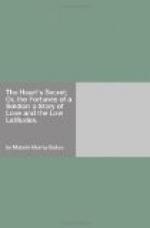“Isabella Gonzales: I know not how to address you, in what tone to write, or even as to the propriety of writing to you at all; but the suspense I now suffer is my excuse. I need not reiterate to you how dearly I love you; you know this, dear one, as fully as any assertion of my own could possibly express it. It is trite that my love for you has partaken in no small degree of a character of presumption, daring, as an humble lieutenant of infantry, to lift my eyes to one as peerless and beautiful as yourself, and of a class of society so far above what my own humble position would authorize me to mingle with. But the past is past, and now my rank and fortune both entitle me to the entree, to your father’s house. I mention not these because I would have them weigh in my favor with you. Far from it. I had rather you would remember me, and love me as I was when we first met.
“Need I say how true I have been to the love I have cherished for you? How by my side in battle, in my dreams by the camp fire, and filling my waking thoughts, you have ever been with me in spirit? Say, Isabella Gonzales, is this homage, so sincere, thus tried and true, unwelcome to you? or do you, in return, love the devoted soldier, who has so long cherished you in his heart as a fit shrine to worship at? I shall see you, may I not, and you will not repulse me, nor speak to me with coldness. O, say when I may come to you, when look once more into those radiant eyes, when tell you with my lips how dearly, how ardently I love you-have ever loved you, and must still love you to the last? I know you will forgive the impetuosity, and, perhaps, incoherent character of this note. Lorenzo Bezan.”
We have only to look into the chamber of Isabella Gonzales, a few hours subsequent to the writing of this letter, to learn its effect upon her.
She was alone; the letter she had read over and over again, and now sat with it pressed to her bosom by both hands, as though she might thus succeed in suppressing the convulsive sobs that shook her whole frame. Tears, the luxury of both joy and sorrow, where the heart is too full of either, tears streamed down her fair cheeks; tears of joy and sorrow both; joy that he was indeed still true to her, and sorrow that such hours, days, nay, years of unhappiness, had been thus needlessly passed, while they were separated from each other, though joined in soul. O, how bitterly she recalled her pride, and remembered the control it had held over her, how blamed herself at the recollection of that last farewell in the prison with the noble but dejected spirit that in spite of herself even then she loved!
She kissed the letter again and again; she wept like a child!




